|
|
 |
|
|

International Update
Genocide in Sudan: The International
Response
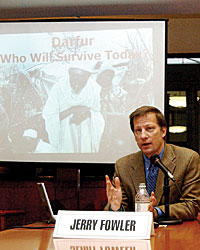
Jerry Fowler, staff director of
the Committee of Conscience of the United States
Holocaust Memorial Museum and GW adjunct professor
Photo by Claire Duggan
|
“Genocide in Sudan: The International
Response,” a panel that GW Law School’s International
Law Society co-sponsored with the D.C. Bar, was held in
the Jacob Burns Law Library in January. Discussion centered
on the legal aspects of the ongoing political and humanitarian
crisis in the Sudan. Questions posed included whether
the tremendous loss of life constitutes genocide or other
crimes under international law, as well as how the United
States, United Nations, and nongovernmental organizations
should respond to the crisis.
David Scheffer, visiting professor of
law and former U.S. ambassador at large for war crimes,
moderated the panel. Panelists included Jerry Fowler,
staff director of the Committee of Conscience of the United
States Holocaust Memorial Museum and also a GW adjunct
professor, and Omer Ismail, program director of Darfur
Peace and Development.
“Before a standing-room only audience,
seasoned experts on Darfur enlightened all of us about
the harsh realities and legal issues relating to the atrocities
there, and made the case for more effective responses
by the U.S. government and the international community.
I was particularly impressed that several government officials
attended and joined the students with their questions,”
Scheffer says.
| 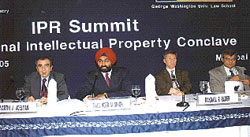
Professor Martin Adelman; Malvinder
Singh, president of Rambaxy Laboratories; Hon. Randall
Rader, JD ’78; and Dr. Raj Davé, LLM
’03, discuss IP issues at an India Project conference
in Mumbai.
The group included Ronald Krasnow,
JD ’90; IP Advisory Board member and former
head of the U.S. Patent and Tradmark Office Todd Dickinson;
Judge Hugh Laddie, chief judge of the Patent Court
of the United Kingdom; and Hon. Dr. Peter Meier-Beck,
German Federal Court of Justice, Karlsruhe. |
The India Project
Dr. Raj Davé, LLM ’03,
has spearheaded the India Project, through which the Law School
helps educate Indian judges, academics, and scientists on
the importance of intellectual property rights. In January,
the India Project organized its second trip to India in as
many years. Conferences and meetings were held in Kolkata,
New Delhi, and Mumbai. Some of the attendees also made a side-trip
to Bangalore, the hub of Indian inventive activity. The trip’s
timing was critical as India’s obligations under the
WTO Trade-Related Aspects of Intellectual Property Rights
came into effect Jan. 1. As Davé states: “Members
of the India Project delegation made a great impact by discussing
the benefits of a good patent system with many sectors of
the Indian population. For all their help and hard work, the
delegates deserve a big hand. My written words are not enough
to thank the delegates.”
| 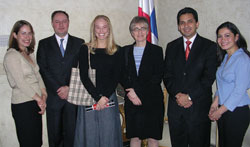
|
Ricardo
Lombana, LLM ’01, deputy chief of the Mission
for the Embassy of Panama, hosted GW Law’s
International Law Society for a reception at the
ambassador’s residence in March. Eduardo Nuñez,
LLM ’01, of Mexico; Clarissa Surgeon, LLM
’05, from Panama; and 2005 JD graduates Melissa
Leibman and Kelly Fry joined Dean Karamanian at
the event. For Lombana, the evening was memorable
as it gave him the chance to reminisce about the
Law School and to have one of his classmates and
close friends, Nuñez, with him for the evening.
|
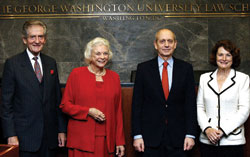
Photo by Claire Duggan |
Supreme Court Videoconference
U.S. Supreme Court Justices Sandra Day
O’Connor and Stephen Breyer spoke with justices from
the Indian Supreme Court via video conference at GW Law
in December. The discussion focused on alternative dispute
resolution. Federal Judge Clifford Wallace of the 9th Circuit
and Federal Judge Fern Smith of the Northern District of
California also participated in the video conference.
|
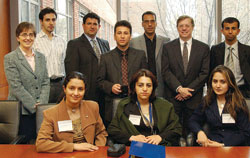
|
Iraqi
Jessup Moot Court
Professor
David Scheffer (standing, second from right) engaged
in a lengthy discussion with members of the Iraqi
Jessup Moot Court team on issues including war
crimes and the trial of Saddam Hussein. JD student
Ali Shaikley (back row, second from left), whose
family is originally from Iraq, participated in
the session and provided invaluable translation
skills.
|
Biodiversity Panel
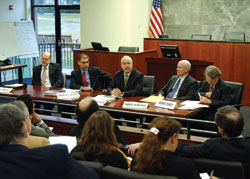
Photo by Claire Duggan |
GW Law and the District of Columbia Bar’s
Environment, Energy, and Natural Resources Section presented
panel discussions on “The United States and the Convention
on Biodiversity” in December. The event was held in
the Jacob Burns Moot Court Room. The topics covered were
“Biodiversity, the CBD, and the CBD-United States
Relationship,” “Biotechnology, Genetic Resources,
and Intellectual Property,” and “The CBD and
Global Conservation.” Speakers and moderators included
Hamdallah Zedan, executive secretary of the Convention on
Biological Diversity; GW Law professor Dinah Shelton; Charles
E. Di Leva, lead environmental law counsel of the World
Bank; and Charlotte De Fontebert of the World Conservation
Union.
Back
to top | Summer 2005 Table of
Contents
|
|
|
|
|